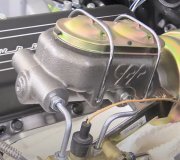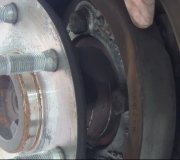The booster check valve has nothing to do with locking brakes so forget that. You still aren't providing many details. What test are you referring to for the booster, and why are you wasting time with that? A booster or check valve problem will result in a brake pedal that's harder than normal to push. If it's the front brakes that are not releasing, why are you playing with what I'm guessing is the height-sensing proportioning valve in the rear?
You also didn't include a time line related to the new master cylinder. It sounds like you have a restriction that is preventing the brake fluid from returning quickly to the master cylinder. That's why I suggested loosening the steel lines or caliper bleeder screws to see where the fluid is being trapped. Have you tried that? I didn't want to go here yet, but it sounds like you have brake fluid contaminated with a petroleum product. Everything rubber that contacts the fluid has to be replaced at once to solve that. This is where knowing the times involved is helpful. The rubber lip seals in the master cylinder will grow past the fluid return ports and trap the fluid. That makes the brakes not release. If you just replace the master cylinder AND all new brake fluid, that contamination will leach out of all the other rubber parts and recontaminate the new fluid. That takes typically half a week to a week for the problem to occur again. The only proper fix for contaminated fluid is to remove all the parts with rubber, including hoses, master cylinder, calipers, wheel cylinders, combination valve, and height-sensing proportioning valve, including those parts you just replaced, flush and dry all the steel lines, THEN install all new parts and fill and bleed the system. If any single part with rubber is left on, or any line is not flushed, all the new parts will become contaminated again.
The best clue to finding contaminated fluid is to look at the rubber bladder seal under the reservoir cap. If it is blown up and mushy, and hard to poke back into the cap, that is what has happened to all the other rubber parts.
Saturday, January 4th, 2014 AT 1:47 PM


